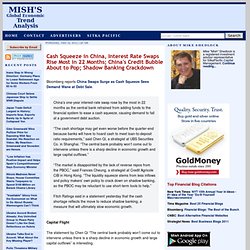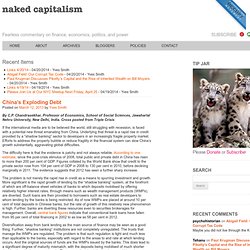

Cash Squeeze in China, Interest Rate Swaps Rise Most in 22 Months; China's Credit Bubble About to Pop; Shadow Banking Crackdown. Bloomberg reports China Swaps Surge as Cash Squeeze Sees Demand Wane at Debt Sale.

China’s one-year interest-rate swap rose by the most in 22 months as the central bank refrained from adding funds to the financial system to ease a cash squeeze, causing demand to fall at a government debt auction. “The cash shortage may get even worse before the quarter-end because banks will have to hoard cash to meet loan-to-deposit ratio requirements,” said Chen Qi, a strategist at UBS Securities Co. in Shanghai. “The central bank probably won’t come out to intervene unless there is a sharp decline in economic growth and large capital outflows.”
“The market is disappointed by the lack of reverse repos from the PBOC,” said Frances Cheung, a strategist at Credit Agricole CIB in Hong Kong. Capital Flight The statement by Chen Qi “The central bank probably won’t come out to intervene unless there is a sharp decline in economic growth and large capital outflows” is interesting. Shadow Banking Crackdown. Fitch warns on risks from shadow banking in China. China Credit-Bubble Call Pits Fitch’s Chu Against S&P. May 29 (Bloomberg) -- Chinese banks are adding assets at the rate of an entire U.S. banking system in five years.

To Charlene Chu of Fitch Ratings, that signals a crisis is brewing. Total lending from banks and other financial institutions in China was 198 percent of gross domestic product last year, compared with 125 percent four years earlier, according to calculations by Chu, the company’s Beijing-based head of China financial institutions. Fitch cut the nation’s long-term local-currency debt rating last month, in the first downgrade by one of the top three rating companies in 14 years. “There is just no way to grow out of a debt problem when credit is already twice as large as GDP and growing nearly twice as fast,” Chu, 41, said in an interview.
Chu’s view puts her in a minority among those charting the future of the world’s biggest nation. Her views have struck a nerve. Crisis Response Bad Loans Unreliable Data Total Credit Reliable Predictor Government Assets Urbanization, Currency. No Guarantees For China's Shadow Banks, Warns JPMorgan Economist. China’s brokerages turn shadow banks. China’s Exploding Debt. By C.P.

Chandrasekhar, Professor of Economics, School of Social Sciences, Jawaharlal Nehru University, New Delhi, India. Cross posted from Triple Crisis If the international media are to be believed the world, still struggling with recession, is faced with a potential new threat emanating from China. Underlying that threat is a rapid rise in credit provided by a “shadow banking” sector to developers in an increasingly fragile property market. Efforts to address the property bubble or reduce fragility in the financial system can slow China’s growth substantially, aggravating global difficulties. The difficulty here is that the evidence is patchy and not always reliable. The problem is not merely the rapid rise in credit as a means to spurring investment and growth. Diversification away from bank lending as the main source of finance may be seen as a good thing. That confidence, as in China’s case, possibly comes from earlier rounds of robust real growth.